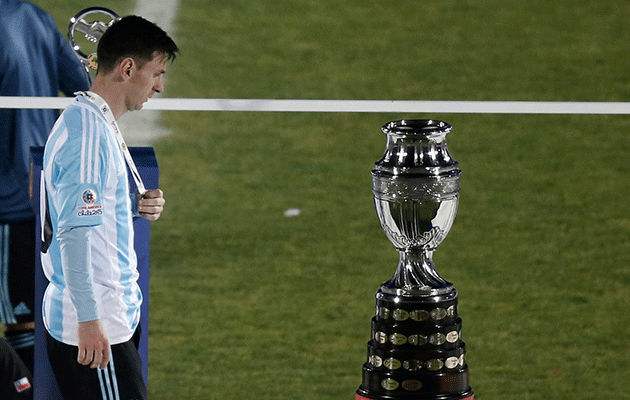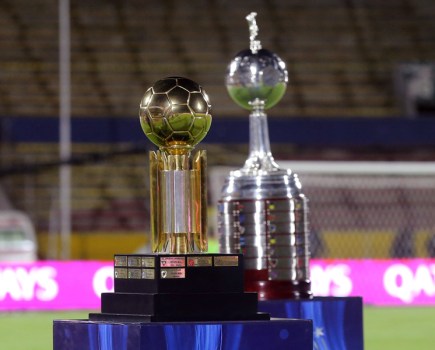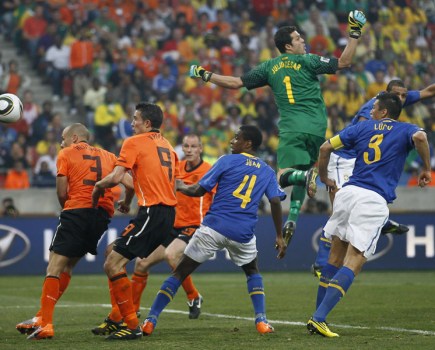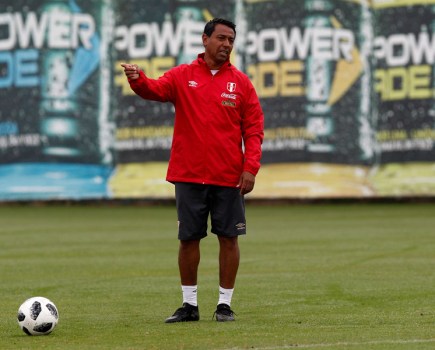Lionel Messi has now been a senior international player for over a decade; his Argentina debut came against Hungary on August 17th 2005.
It is not an occasion that he can look back upon with a great deal of pleasure. Just turned 18, he was unleashed as a second half substitute. He was straight into the action, but after only two minutes he launched himself on one of those characteristic runs, ball tied to his left foot. An opponent held on to him, dragging him back. Messi fought to free himself and was absurdly sent off for throwing an elbow.
Dragging Messi back in recent times has been his lack of a senior international title. He could hardly have come closer, carrying Argentina to narrow defeat in last year’s World Cup final, and then losing out to Chile in a shoot out in the final of this year’s Copa America. 46 goals in 103 caps is a magnificent record, with 29 of them coming in the last 40 games, when he has been the captain. But the lack of silverware with his country is always brought up in every discussion about his place in the all time pantheon.
The great Tostao, Brazil’s 1970 World Cup centre forward, is in no doubt that his attacking partner Pele was the best ever. He concedes that Messi is better at setting up the play. But he believes that Messi “lacks the personal transformation, the fury that Pele and other superstars had in big games and in the greatest difficulties. Pele was like a cornered animal, uptight when he was unable to do what he liked and what he wanted. He would try other solutions.”
It is an interesting psychological analysis. Messi is clearly a quieter, less demonstrative figure than Pele or Diego Maradona. “He is not self-sufficient,” continues Tostao, “he does not have the absolute lack of modesty which [renowned Brazilian writer] Nelson Rodrigues used to say was Pele’s greatest quality.”
Messi, then, is a player for whom the collective context is all important. This, in essence, is Tostao’s argument. He cites a moment in the Copa America final, in the last minute of normal time, when Messi at last managed to turn and slip his markers before launching a run that took him to the edge of the area – where he slipped a pass to Ezequiel Lavezzi on the left. Lavezzi squared, but Gonzalo Higuain arrived at the far post a fraction of a second too late to steer the ball home. Tostao calls Messi’s choice of move “correct,” but says that “the other option, to try and complete the move on his own, is what he should have done. Messi plays with Argentina as he does for Barcelona,” he continues. “A virtue in his club side, choosing the moment to go for the solo move, is a defect with his country, because it makes him trust too much in the collective game.”
This is also fascinating, but perhaps a little unfair. It just so happened that at this moment his attacking partners were Lavvezzi and Higuain. Angel Di Maria had pulled up injured and Sergio Aguero had been substituted, almost certainly an error. But a collective context where Messi is partnered by a fit and firing Di Maria and Aguero is not radically different from the one he plays in every week for Barcelona.
There is, though, a substantial difference in the context of the team as a whole. Tostao may well argue that “Messi plays with Argentina as he does for Barcelona.” But however rich their attacking resources, it cannot be argued that Barcelona play as Argentina do. There are fundamental differences – the main one being in the positioning of the defensive line.
Barcelona, of course, are known for pressing to win the ball back as soon as they have lost it, with the back four playing high up the field. Argentina’s current crop of centre backs lack the pace to do anything similar, and so the line tends to drop much deeper. This obviously has implications on the way Messi plays. When Argentina win back possession they are often much further from goal than is the case with Barcelona. Messi has a much greater area of the pitch to cover – which surely helps explain the end of season burn out he seemed to be suffering during the World Cup and in the final of the Copa America.







